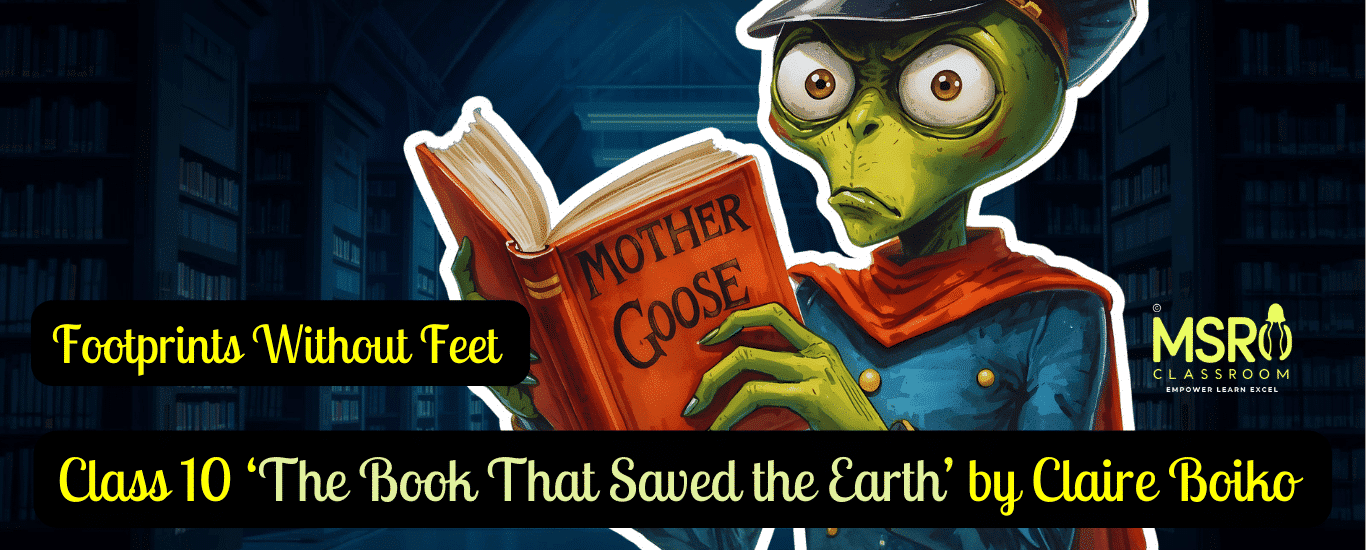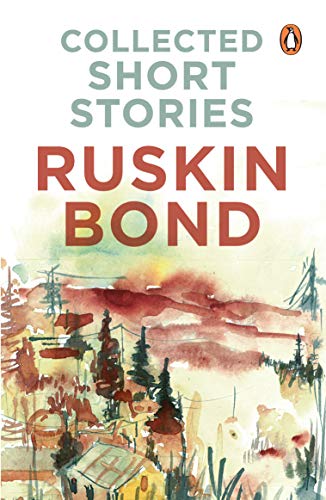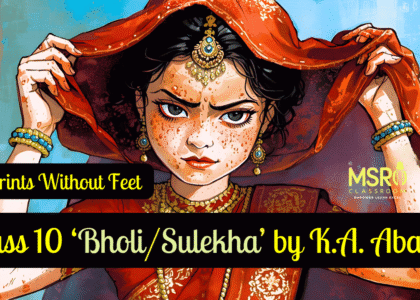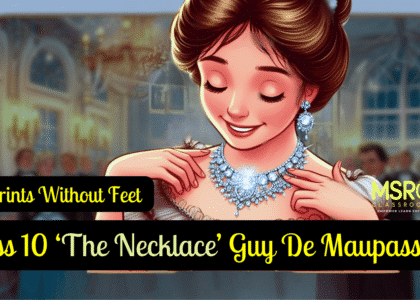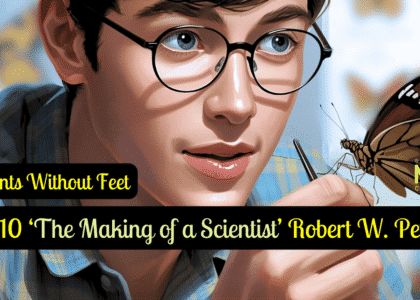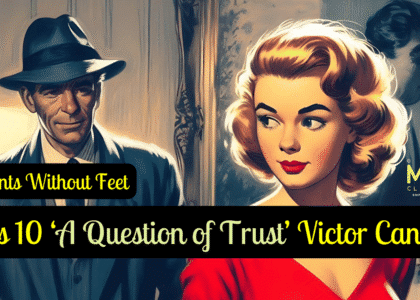Chapter 8, Claire Boiko’s ‘The Book That Saved the Earth’ Analysis, Summary, Character Sketches, Theme, Word Meanings, Questions Answers and Extra Questions.
Chapter 8- ‘The Book That Saved the Earth’ by Claire Boiko
Table of Contents
More from First Flight: Class 10 PROSE & Class 10 POETRY
Vocabulary/Word Meanings:
| Alarming: Causing fear or concern. Chuckling: Softly or quietly laughing. Decipher: To decode or understand something. Desist: To stop doing something. Dubiously: With doubt or suspicion. Gravely: Serious or solemn. Haberdashery: A shop for men’s clothing and accessories; humorously misunderstood in context. Historiscope: A fictional device showing historical events or images. Haughtily: Showing arrogance or superiority. Levity: Lightheartedness, often inappropriate. Pantomimes: Communicating through gestures without speech. Peevishly: Irritably or grumpily. Salutation: A formal greeting. Squiggles: Small, curvy marks. Trifling: Of little importance; insignificant. Tome: A large scholarly book. ‘Marbles in your ears?’: A phrase questioning someone’s attention or comprehension, used to express frustration. |
Summary ‘The Book That Saved the Earth’ by Claire Boiko:
The Book That Saved the Earth by Claire Boiko is a humorous play set in the 25th century. In it, a historian explains how a book stopped a Martian invasion in 2040. Think-Tank, the arrogant leader of Mars, sends a crew to Earth to prepare for an attack.
They mistake a library for a refreshment stand and books for “communication sandwiches.” Misinterpreting nursery rhymes like Mother Goose, Think-Tank believes Earthlings possess advanced technology and dangerous knowledge, such as growing metals and teaching animals space travel.
Frightened, Think Tank cancels the invasion. The play highlights the power of books and human imagination, using humour to explore intelligence and cultural misunderstanding themes. Ultimately, Earth’s creativity saves it from disaster.
Explanation of ‘The Book That Saved The Earth’ for Auditory Learners:
Duration: 10 minutes
Concise, Comprehensive, Exam-Oriented. Perfect for Revision and Learning.
Theme ‘The Book That Saved the Earth’:
1. Power of the Written Word:
The central theme in The Book That Saved the Earth is that books hold power and cannot be replaced. Throughout the play, books are portrayed as essential sources of knowledge, wisdom, and culture that shape humanity. The Martians’ misunderstanding of books as dangerous and advanced technology highlights their underestimation of their value and importance.
The play humorously explores the concept of miscommunication and misunderstanding between different civilisations (Earthlings and Martians) and how something as simple as a book—specifically a nursery rhyme book—can have profound effects.
The play emphasises that no technology or force can replace books’ unique power to preserve and transmit knowledge across generations, showing that books are irreplaceable in their ability to influence and shape our world.
2. Power of Knowledge and Imagination:
Another theme in The Book That Saved the Earth is the power of knowledge and imagination. The play humorously explores how books, particularly stories and nursery rhymes, are misunderstood by the Martians, who view them as dangerous and advanced technology. The misunderstanding highlights how important and influential knowledge can be, even in simple forms like children’s books.
The play also touches on cultural misunderstandings—the Martians’ failure to comprehend Earth’s ways shows how differences in perspective can lead to conflict. Ultimately, the theme suggests that human creativity and imagination are powerful forces that can solve problems and even protect the planet from external threats.
3. Cultural Misunderstandings:
The play uses humour to portray the Martians’ complete misunderstanding of Earth customs, mainly using books. Their misinterpretation of sandwiches, nursery rhymes, and other Earthly things represents how cultural differences can lead to confusion and how communication and learning can bridge those gaps.
The play also uses humour and satire to explore how seemingly insignificant things—like nursery rhymes—can be elevated to a matter of life or death, poking fun at the seriousness with which the Martians approach their mission. It shows how the simple and the mundane can sometimes carry greater weight than the Martians (or anyone) might expect.
Co-Scholastic Reading List (Teens)
Breakdown of Characters from the play ‘The Book That Saved the Earth’:
1. Historian:
- The narrator (she) of the story guides the audience through the events.
- Knowledgeable, humorous, and engaging.
- Introduces the play and explains how a book saved Earth.
2. Great and Mighty Think-Tank:
- Martian commander-in-chief planning the invasion of Earth.
- Huge, egg-shaped head (emphasising his intellectual superiority).
- Egotistical, self-important, and overly confident.
- Leads the Martian invasion, misinterprets Earth’s culture, and panics over nursery rhymes.
3. Sergeant Oop:
- Martian soldier under Think-Tank’s command.
- Depicted as somewhat clumsy.
- Confused and obedient, but lacks intelligence.
- Eats a book (mistaking it for food), participates in misunderstanding Earth customs.
4. Lieutenant Iota:
- Martian officer working with Captain Omega.
- Serious but confused by Earth’s strange objects.
- Counts books, interact with them, and tries to make sense of Earth’s customs.
5. Apprentice Noodle:
- Think-Tank’s assistant.
- Obedient is somewhat eager to please and later becomes the wise leader of the Martians.
- Assists Think-Tank provides insights (like Earthlings using books as communication).
6. Captain Omega:
- Leader of the Martian probe crew on Earth.
- Authoritative, but slightly confused by the unfamiliar Earth objects.
- Coordinates with the team follows Think-Tank’s orders, and helps decipher nursery rhymes later.
7. Offstage Voice:
- A disembodied voice responding to Think-Tank’s questions.
- It affirms Think-Tank’s ego but only speaks when called upon.
- Provide Think-Tank with the answers to his mirror question (“You, sir.”).
Questions Answers ‘The Book That Saved the Earth’:
| Q1: Why was the twentieth century called the ‘Era of the Book’? A1: The twentieth century was called the “Era of the Book” because books were significant during that time. People used books to learn, teach, and understand everything from animals to science. Q2: Who tried to invade the Earth in the twenty-first century? A2: Martians (people from Mars) tried to invade Earth in the twenty-first century. Their leader was the Great and Mighty Think Tank. Q3: What guesses are made by Think-Tank about the books found on Earth? A3: Think-Tank guesses that the books are: A refreshment stand (because the books look like food, like a sandwich). A communication device (he thinks the books are used to send messages by listening to them). A source of great knowledge (he eventually realises the books contain information, like nursery rhymes). |
THINK ABOUT IT:
Q1: How does Noodle avoid offending Think-Tank but still correct his mistakes?
A1: Noodle avoids offending Think-Tank by using respectful language and being patient. Instead of directly saying Think-Tank is wrong, he often softens his words. For example, he adds polite phrases like “Forgive me, your Brilliance” or “Excuse me, your Cleverness” before offering his correction. The deferential terms show respect and help Noodle express his ideas without upsetting Think-Tank. He also agrees with Think-Tank’s ideas before suggesting a different approach.
Q2: If you were in Noodle’s place, how would you handle Think-Tank’s mistakes?
A2: (Subjective Answer) I would use the same approach if I were in Noodle’s place. I would be respectful and polite, showing that I understand Think-Tank’s position. I would softly correct Think-Tank’s mistakes by acknowledging his ideas and then gently suggesting, “I think there’s another way to think about it,” or, “I have an idea that might help.” I would also stay calm and support Think-Tank’s plans while guiding him towards the correct answer. I would avoid saying he is wrong directly to ensure I correct him without offending him.
Q3: Do you think books are being replaced by the electronic media? Can we do away with books altogether?
A3: Yes, electronic media like e-books and audiobooks are becoming more popular, but I don’t think books will ever be wholly replaced. Electronic media is convenient because we can carry many books on a single device, but physical books have a unique charm.
Electronics cannot replace the feel of a book, the smell of its pages, and the experience of reading in a quiet space. Books are not likely to disappear because they offer a unique experience that technology cannot fully copy. Books and electronic media can exist together, allowing people to read in different ways.
Q4: Why are books referred to as a man’s best companion? Which is your favourite book and why? Write a paragraph about that book.
A4: (Subjective Answer) Books are called a man’s best companion because they offer knowledge, entertainment, and comfort. They can teach us new things, help us escape into other worlds, and give us valuable lessons.
My favourite book is The Lord of the Rings by J.R.R. Tolkien. It is an epic fantasy novel about Frodo Baggins, a hobbit who embarks on a dangerous journey to destroy a powerful ring. Along with his companions, Frodo faces various challenges and battles dark forces trying to take control of the world. The novel contains memorable characters like Aragorn, Gandalf, and Legolas, who teach important lessons about friendship, courage, and hope. The richly detailed world of Middle-earth, with its beautiful landscapes and complex histories, captivates readers. I love the themes of good versus evil, personal sacrifice, and the power of unity. This book is inspiring and has a lasting impact on anyone who reads it.
TALK ABOUT IT:
Q1: In what ways does Think-Tank misinterpret innocent nursery rhymes as threats to the Martians? Can you think of any incidents where you misinterpreted a word or an action? How did you resolve the misunderstanding?
A1: (Subjective Answer) In the play, Think-Tank misinterprets the innocent nursery rhymes as threats to the Martians. For example, when he hears the rhyme “Humpty Dumpty had a great fall,” he thinks it refers to an attack on him and Mars. He also believes that the rhyme “Hey diddle diddle” indicates that Earthlings have taught their animals to launch an interplanetary attack. Think-Tank’s misunderstanding comes from his inability to recognise nursery rhymes’ playful, harmless nature.
I once misinterpreted the phrase ‘break a leg’ when I heard it and thought it meant to break someone’s leg literally. I was confused until someone explained that wishing someone good luck is an expression, especially before a performance. I resolved the misunderstanding by asking them to clarify, and they explained that it’s a common phrase people use to wish someone well before their performance. I was giving a dance performance that day.
Q2: The aliens in this play speak English. Do you think this is their language? What could be the language of the aliens?
A2: In the play, the aliens speak English, which may not necessarily be their original language. No, I don’t think it is their language. However, they could have learned English after coming to Earth or communicating with humans. Like the Martians, the aliens would have their unique language, which could completely differ from any human language.
Their language might consist of sounds, symbols, or even telepathic signals. If we imagine their language, it could be complex and not based on words like in human languages. They may communicate using gestures, colours, or vibrations. The idea of aliens having their language adds mystery and curiosity about how beings from other planets might understand each other.
Extra Questions ‘The Book That Saved the Earth’:
Short Answer Type Questions:
Q1: What is the significance of the title The Book That Saved the Earth?
A1: The title refers to how a simple book of nursery rhymes prevents a Martian invasion. The Martians misunderstand the book’s content, thinking it contains Earth’s secret knowledge and power. Their confusion causes them to panic and abandon their plans, showing how knowledge can save the day, even in unexpected forms.
Q2: How do the Martians initially misunderstand books on Earth?
A2: The Martians think books are food and call them “sandwiches.” They later believe books are communication devices and try listening to them. Finally, they assume books contain secret codes about Earth’s advanced technology. Their confusion adds humour and highlights their lack of understanding of Earth’s culture.
Q3: What qualities of Think-Tank make him a humorous character?
A3: Think-Tank is overly proud, often demanding praise and admiration. His large, egg-shaped head adds to the comedy. Despite his arrogance, he misunderstands simple Earth objects, like books, and panics when faced with nursery rhymes, showing how his supposed intelligence is not as great as he claims.
Q4: Why did the Martians abandon their invasion of Earth?
A4: The Martians misinterpret Earth’s nursery rhymes as signs of advanced technology and power. They believe humans can grow metals, train animals in space travel, and prepare for war. Think-Tank panics, thinking Earth plans to invade Mars. His fear leads them to abandon the invasion and flee to another galaxy.
Q5: What role does Noodle play in the story’s resolution?
A5: Noodle is a calm and clever assistant who suggests ideas that help Think-Tank understand the situation. By sharing observations and insights, Noodle subtly guides decisions without confronting Think-Tank. Ultimately, Noodle’s intelligence and reasoning pave the way for peace and better relations between Earth and Mars.
Q6: How does the Historian describe the twentieth century in the opening scene?
A6: The Historian calls the twentieth century “the Era of the Book,” explaining how books were essential for learning, teaching, and decorating. She humorously introduces the idea that a book saved Earth from a Martian invasion, setting the stage for the story about the power of knowledge and misunderstandings.
Q7: What lesson does the play convey about intelligence and knowledge?
A7: The play shows that intelligence is not just about having a big brain but also about understanding and using knowledge wisely. The Martians, especially Think Tank, lack practical understanding and make funny mistakes. It teaches us to value curiosity, learning, and humility when exploring the unknown.
Q8: Why is Mother Goose significant in the story?
A8: The book Mother Goose saves Earth because the Martians misunderstand its nursery rhymes. They think it reveals Earth’s advanced abilities, like growing metals and training animals. This new information (misinformation) frightens them and makes them abandon their invasion. The book symbolises how knowledge can create powerful misunderstandings, even in simple forms.
Q9: What misunderstandings do the Martians have about Earth’s culture?
A9: The Martians think books are food called “sandwiches,” then believe they are communication devices. They misunderstand nursery rhymes as codes about Earth’s advanced technology, like growing metals and launching cows into space. These funny mistakes highlight their lack of understanding and how cultural differences can lead to confusion.
Q10: How does the play mix science fiction and humour to deliver its message?
A10: The play combines science fiction with humour by showing Martians misinterpreting Earth objects, like books and nursery rhymes, in absurd ways. Think-Tank’s arrogance and panic create funny moments. This mix entertains while teaching the importance of understanding other cultures and the value of knowledge in resolving conflicts.
Long Answer Type Questions:
Q1: How does the Historian introduce the story of the Martian invasion, and what does she reveal about the importance of books in the twentieth century?
A1: The Historian begins by welcoming the audience to the Museum of Ancient History. She explains that the twentieth century was called the “Era of the Book” because books were used to teach, inform, and entertain.
She describes how books covered all topics, from animals to history, and were crucial for human learning and creativity. Then, she introduces the story of the Martian invasion of Earth in 2040. She reveals that the invasion failed because of one unique book, which surprised the audience.
The book was not about science or weapons, but a simple collection of nursery rhymes called “Mother Goose.” The Historian sets the stage for the story, showing how books can influence and even save the world.
Q2: Describe the character of Great and Mighty Think-Tank. How does his personality influence the events of the play?
A2: Great and Mighty Think-Tank is the leader of the Martians. He is very proud and thinks he is the most intelligent creature in the universe. He loves being praised and admires his “great balloon brain.” However, Think-Tank is not as bright as he believes.
His arrogance makes him overconfident and blind to simple truths. For example, he misunderstands books, thinking they are sandwiches or communication devices. His personality leads to many funny moments as he tries to prove his intelligence.
His fear and imagination turn nursery rhymes into dangerous “codes,” causing him to panic and cancel the invasion of Earth. Think-Tank’s ego and misunderstandings drive the play’s humour and outcome.
Q3: What do the Martians initially think books are, and how do their misunderstandings contribute to the play’s humour?
A3: The Martians first think books are strange objects and do not know their purpose. Great and Mighty Think-Tank says books are sandwiches because Earthlings eat a lot. He tells the crew to eat a book, creating a funny scene when Sergeant Oop struggles to eat one.
Later, Think-Tank decides books are communication devices and orders the crew to listen to them. When this doesn’t work, he says books are for “eye communication” and makes the crew “read” a book. Their confusion grows as they try to understand the nursery rhymes, imagining Earthlings as powerful and advanced.
These misunderstandings are funny because the audience knows the truth, while the Martians’ mistakes lead to silly and exaggerated conclusions.
Q4: How does the Martian crew interpret the nursery rhymes, and what conclusions do they draw about Earthlings’ capabilities?
A4: The Martian crew misunderstands the nursery rhymes and believes they are secret codes. When they read “Mistress Mary, Quite Contrary,” they think Earthlings can grow rare metals like silver and cockle shells.
Their discovery leads them to believe Earthlings are advanced and can create dangerous weapons. Next, when they read “Hey Diddle Diddle,” they think Earthlings have trained animals, like cows, to perform space travel, imagining that millions of cows might attack Mars.
Finally, after reading “Humpty Dumpty,” they think Earthlings have the technology to destroy planets and invade Mars. The Martians draw these wild conclusions because they don’t understand the playful and simple nature of the nursery rhymes. Their fear and confusion add humour to the play.
Q5: What lesson does the play convey about intelligence and the importance of understanding other cultures?
A5: The play teaches that intelligence is not just about knowing facts or being powerful; it also involves understanding and learning from others. The Martians, led by Great and Mighty Think-Tank, are intelligent but misunderstand Earth’s culture because they don’t know about books and nursery rhymes.
Their lack of knowledge leads them to make silly conclusions and almost start an invasion. The play shows that it is important to be open-minded and learn about other cultures to avoid misunderstandings.
It also highlights the value of simple things, like books and stories, which can have a big impact. The play reminds us that true intelligence comes from understanding others, not just being the smartest in the room.
Q6: How do the events of the play resolve, and what changes occur in Mars-Earth relations by the twenty-fifth century?
A6: At the end of the play, the Martian invasion is stopped because of the misunderstandings caused by the nursery rhymes. Great and Mighty Think-Tank panics when he believes Earthlings are advanced and might invade Mars.
He orders the invasion fleet to leave Earth and flee to Alpha Centauri. By the twenty-fifth century, Mars and Earth had become friendly. The Earthlings taught the Martians how to read and understand books. They even helped them set up a library in the Martian capital, Marsopolis.
However, the Martians still avoid reading nursery rhymes, like “Mother Goose,” because of their past fear. The play ends with a funny note, showing how Earth and Mars moved from conflict to understanding and friendship.
Q7: What role do books play in the Martian misunderstanding, and how does their misinterpretation of “Mother Goose” become central to the plot’s resolution?
A7: In the play, books play a key role in the Martian misunderstanding. The Martians, led by Great and Mighty Think-Tank, believe books are strange objects with mysterious powers, like sandwiches or communication devices.
They try to read them and think they are secret codes. When they open “Mother Goose” nursery rhymes, they mistakenly believe the Earthlings have advanced technology, like growing metals or training animals for space travel. The misconception nearly leads to a Martian invasion of Earth.
However, when they read “Humpty Dumpty” and Think-Tank realises the rhyme’s character looks like him, he panics and cancels the invasion. The misinterpretation of the books, especially “Mother Goose,” is central to the plot, as it stops the Martians from attacking Earth and helps resolve the conflict.
Important Excerpts ‘The Book That Saved the Earth’:
1. THINK-TANK: “Mirror, mirror, in my hand. Who is the most fantastically intellectually gifted being in the land?”
Context: Think-Tank, the leader of the Martians, is talking to his mirror. This is a playful reference to the famous fairy tale Snow White, where the queen asks a mirror the same question. In this case, Think-Tank asks the mirror to praise him for his intelligence. It shows that Think-Tank is very proud and thinks of himself as the smartest being in the universe.
3. NOODLE: “Well, sir, I have seen surveyor films of those sandwiches. I noticed that the Earthlings did not eat them. They used them as some sort of communication device.”
Context: Noodle, Think-Tank’s assistant, suggests that the books (which the Martians mistake for sandwiches) are not meant to be eaten but to communicate. The aliens initially thought the books were food, but noodles helped them understand that books are used for communication. Martians misunderstand Earth culture and how Noodle tries to help them understand.
4. THINK-TANK: “The Earthlings have discovered how to combine agriculture and mining. They can actually grow crops of rare metals such as silver. And cockle shells. They can grow high explosives, too.”
Context: Think Tank misinterprets a nursery rhyme and believes Earthlings can grow valuable metals like silver and dangerous materials like explosives in their gardens. He takes the nursery rhyme’s words literally. This exemplifies/illustrates how the Martians misunderstand Earth’s culture and language. The Martians take everything they see and hear at face value without understanding its meaning.
5. HISTORIAN: “And that’s how one dusty old book of nursery rhymes saved the world from a Martian invasion.”
Context: The Historian reveals that a book of nursery rhymes stopped the Martians from invading Earth. This is an important moment in the story, as it shows how something as simple as nursery rhymes, which the Martians did not understand, became the key to saving the Earth. It suggests that even simple things can have great power.
6. “Noodle, you keep on exercising your mind, and someday you’ll have a balloon brain just like mine.”
Context: Think-Tank, the leader of the Martians, is speaking to Noodle, his assistant. Think-Tank has a huge head, which he calls a “balloon brain.” He says Noodle should use his brain more to become as smart as Think-Tank. It shows that Think-Tank is very proud of his intelligence and believes it makes him superior.
7. “I’ve counted two thousand of these peculiar items. This place must be some sort of storage barn.”
Context: Lieutenant Iota is confused about the objects she and the other Martians find on Earth. She looks at books but doesn’t understand what they are. She calls them “peculiar items” (strange things). Iota thinks they are in a “storage barn,” where things are kept because she doesn’t know what the books are for.
8. “Listen to them? Do you have marbles in your ears? I said, listen to them.”
Context: Think-Tank is telling the Martian crew to listen to the books. However, the crew doesn’t hear anything because books do not make sounds. The Martians try to “listen” to the books as if they are some kind of communication device, but they do not understand that books are for reading, not for listening. Martians misunderstand the purpose of books.
9. “I seem to recall that the Earthlings did not listen to the sandwiches; they opened them and watched them.”
Context: Apprentice Noodle remembers that Earthlings do not listen to books (or sandwiches, as the Martians call them). Instead, they open them and look at them. This is a turning point in the play where the Martians begin to understand that the books are for reading, not listening. The excerpt shows how they slowly start to learn about Earth’s culture.
10. “It’s me! It’s my Great and Mighty Balloon Brain. The Earthlings have seen me, and they’re after me!”
Context: When the Martians read the rhyme about Humpty Dumpty, Think-Tank panics because he believes the rhyme is about him. Humpty Dumpty falls and cannot be put back together in the rhyme. Think-Tank thinks it means the Earthlings want to capture him, leading him to believe that Earth is dangerous. Martians misinterpret simple Earth rhymes and misunderstand Earth’s culture.
11. “Cease laughter. Desist. This is more and more alarming. The Earthlings have reached a high level of civilisation. Didn’t you hear? …………….Notify the invasion fleet. No invasion today Oop, transcribe the next code.”
Context: In this part, Think-Tank is very worried about Earth. He believes Earthlings have taught their pets, like dogs, to do special things, such as play music and use space technology. He even thinks Earth’s dogs have a sense of humour. Think-Tank imagines Earthlings planning an attack with cows from space, which is a funny misunderstanding. He tells his assistant, Oop, to stop the invasion and focus on the next task.
12. “It’s me! It’s my Great and Mighty Balloon Brain. The Earthlings have seen me, and they’re after me. “Had a great fall!” — That means they plan to capture Mars Central Control and me! It’s an invasion of Mars!
Context: Think-Tank becomes very scared because he believes Earthlings have discovered him and plan to attack Mars. He thinks a nursery rhyme, Humpty Dumpty- an egg-headed character “Had a great fall,” is about him and that the Earthlings want to capture Mars.
Some links on this page may be affiliate links. This helps support MSRO Classroom at no additional cost to readers.

